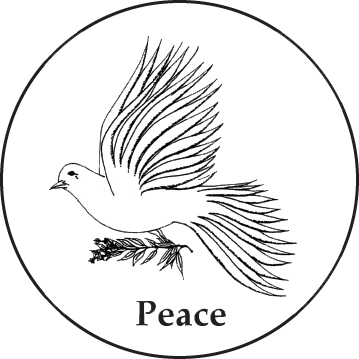
A Peace Shrine


|
A Peace Shrine |

|
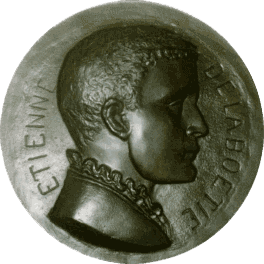 Étienne de la Boétie
Étienne de la Boétie
|
1490-1563 | French writer and political philosopher. His essay The Politics of Obedience: The Discourse on Voluntary Servitude asserts that tyranny rests on the acquiescence of the ruled, and that people need not overpower rulers to become free, but simply withdraw their support. La Boétie is the "founder" of mass civil disobedience and non-violent resistance. |
"From all these indignities, such as the very beasts of the field would not endure, you can deliver yourselves if you try, not by taking action, but merely by willing to be free. Resolve to serve no more, and you are at once freed. I do not ask that you place hands upon the tyrant to topple him over, but simply that you support him no longer; then you will behold him, like a great Colossus whose pedestal has been pulled away, fall of his own weight and break into pieces." - The Politics of Obedience |
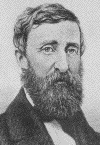 Henry David Thoreau |
1817-1862 | American writer, naturalist, and philosopher. He was jailed for refusing to pay a poll tax supporting the Mexican War. He wrote about his experience and justification for putting individual conscience over authority in Resistance to Civil Government (also known as Civil Disobedience.) | "A minority is powerless while it conforms to the majority; it is not even a minority then; but it is irresistible when it clogs by its whole weight. If the alternative is to keep all just men in prison, or give up war and slavery, the State will not hesitate which to choose. If a thousand men were not to pay their tax-bills this year, that would not be a violent and bloody measure, as it would be to pay them, and enable the State to commit violence and shed innocent blood." - Resistance to Civil Government |
 William Lloyd Garrison |
1805-1879 | Abolitionist and editor of "The Liberator." Garrison's approach to emancipation stressed nonviolence and passive resistance. Garrison proposed ending slavery by refusing to obey the Fugitive Slave Laws, and supported secession by the New England states - "No union with slaveholders!" He publicly burned the Constitution since it condoned slavery. | "I am aware that many object to the severity of my language; but is there not cause for severity? I will be as harsh as truth, and as uncompromising as justice. On this subject, I do not wish to think, or to speak, or write, with moderation. No! no! Tell a man whose house is on fire to give a moderate alarm; tell him to moderately rescue his wife from the hands of the ravisher; tell the mother to gradually extricate her babe from the fire into which it has fallen - but urge me not to use moderation in a cause like the present. I am in earnest - I will not equivocate - I will not excuse - I will not retreat a single inch - AND I WILL BE HEARD." - The Liberator |
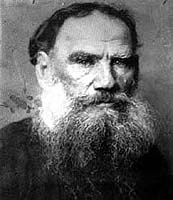 Leo Tolstoy |
1828-1910 | Russian novelist, pacifist, and Christian anarchist. Tolstoy used nonviolent means to resist Czarist tyranny on behalf of peasants. His book The Kingdom of God is Within You tells of his experiences and presents his Christian "doctrine of nonresistance to evil by force." | "The Quakers sent me books, from which I learnt how they had, years ago, established beyond doubt the duty for a Christian of fulfilling the command of non-resistance to evil by force, and had exposed the error of the Church's teaching in allowing war and capital punishment. ... One could only wonder how this impossible reconciliation of Christian teaching with the use of force, which has been, and is still, preached in the churches, could have been maintained in spite of it." - The Kingdom of God is Within You |
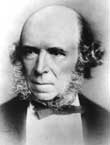 Herbert Spencer |
1820-1903 | Philosopher, sociologist, psychologist, and polymath intellectual of 19th century Britain. His first principle, the law of equal freedom, was: "Every man has freedom to do all that he wills, provided he infringes not the equal freedom of any other man." Spencer strongly opposed British imperialism in various writings. He founded the Anti-Aggression League to oppose the Boer War. | Many will ask, "What would be the use of our relinquishing war, unless other nations will agree to do so likewise?" The same parties frequently put a similar question, by way of an excuse for not assisting in the reformation of social abuses - What can one man do? Need they be told that men never come unanimously to the same conclusion, at the same time, and that it is impossible they should do so? Need they be told that all great changes have emanated from individuals? Need they be told that what each leaves to the rest, no one does?... What is here true of men individually, is true of men in masses. Never need we expect to see all nations abandon war at the same time. One must lead the way. - The Proper Sphere of Government |
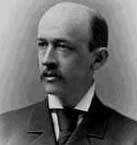 William Graham Sumner |
1840-1910 | Yale professor; held chair of Political Philosophy and Sociology, and wrote books on subjects ranging from economic history to anthopology. Sumner pioneered the concepts of diffusion, folkways, and ethnocentrism. He was vice-president of the Anti-Imperialist League, which opposed the Spanish-American War and the occupation of the Philippines. His most famous anti-imperialist essay was The Conquest of the U. S. by Spain. | In the first place, war and expansion will favor jobbery, both in the dependencies and at home. In the second place, they will take away the attention of the people from what the plutocrats are doing. In the third place, they will cause large expenditures of the people’s money, the return for which will not go into the treasury, but into the hands of a few schemers. In the fourth place, they will call for a large public debt and taxes, and these things especially tend to make men unequal, because any social burdens bear more heavily on the weak than on the strong, and so make the weak weaker and the strong stronger. Therefore expansion and imperialism are a grand onslaught on democracy. - The Conquest of the U. S. by Spain |
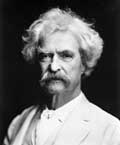 Mark Twain |
1835-1910 | Renowned author, humorist, and lecturer. Twain spent the last twenty years of his life as an outspoken anti-imperialist. The War Prayer is a famous anti-war short story. To the Person Sitting in Darkness is an essay critical of the US occupation of the Philippines. It was adopted and reprinted by the Anti-Imperialist League. | I have read carefully the treaty of Paris, and I have seen that we do not intend to free, but to subjugate the people of the Philippines. We have gone there to conquer, not to redeem. It should, it seems to me, be our pleasure and duty to make those people free, and let them deal with their own domestic questions in their own way. And so I am an anti-imperialist. I am opposed to having the eagle put its talons on any other land. |
 Mahatma Gandhi |
1869-1948 | Key figure in the Indian sub-continent's secession from the British Empire. Adapting Thoreau's individual civil disobedience to a mass scale, Gandhi taught satyagraha - non-violent resistance. He succeeded in winning independence from the empire by means such as boycott and non-compliance with authority. He envisioned swaraj - local rule - a Hindu approach to individualist anarchism. | I appeal for cessation of hostilities ... because war is bad in essence. You want to kill Nazism. Your soldiers are doing the same work of destruction as the Germans... I venture to present you with a nobler and a braver way, worthy of the bravest soldiers... I would like you to lay down the arms you have as being useless for saving you or humanity. You will invite Herr Hitler and Signor Mussolini to take what they want of the countries you call your possessions... You will give all these but neither your souls, nor your minds. |
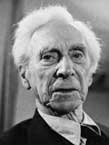 Bertrand Russell |
1872-1970 | Philosopher, logician, mathematician, historian, advocate for social reform, and pacifist. He was a prominent anti-war activist, championing free trade between nations and anti-imperialism. Russell was imprisoned for his pacifist activism during World War I. He campaigned against Adolf Hitler, for nuclear disarmament, criticised Soviet totalitarianism, and the USA's involvement in the Vietnam War. |
"Either man will abolish war, or war will abolish man." "War does not determine who is right, only who is left." "There lies before us, if we choose, continual progress in happiness, knowledge, and wisdom. Shall we, instead, choose death, because we cannot forget our quarrels? We appeal as human beings to human beings: Remember your humanity, and forget the rest. If you can do so, the way lies open to a new Paradise; if you cannot, there lies before you the risk of universal death." |
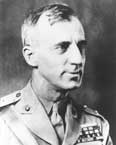 Smedley Butler |
1881-1940 | American general turned anti-interventionist. His book War Is a Racket was one of the first works describing the workings of the military-industrial complex. After retiring from the military, he became a popular speaker at meetings organized by veterans, pacifists and church groups in the 1930s. | "War is a racket. It always has been. It is possibly the oldest, easily the most profitable, surely the most vicious. It is the only one international in scope. It is the only one in which the profits are reckoned in dollars and the losses in lives. ... Only a small 'inside' group knows what it is about. It is conducted for the benefit of the very few, at the expense of the very many. Out of war a few people make huge fortunes." - from the book War Is a Racket |
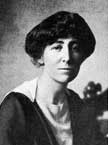 Jeannette Rankin |
1880-1973 | First woman to be elected to the US Congress. A lifelong pacifist, she voted against the entry of the United States into both WWI and WWII, the only member of Congress to vote against the latter. She was founding Vice-President of the American Civil Liberties Union and a founding member of the Women's International League for Peace and Freedom. In 1968, Rankin led more than 5,000 women calling themselves "The Jeannette Rankin Brigade" to the US Capitol to demonstrate their opposition to the Vietnam War. |
"You can no more win a war than you can win an earthquake. " "There can be no compromise with war; it cannot be reformed or controlled; cannot be disciplined into decency or codified into common sense; for war is the slaughter of human beings, temporarily regarded as enemies, on as large a scale as possible." [1929] "It is unconscionable that 10,000 boys have died in Vietnam.... If 10,000 American women had mind enough they could end the war, if they were committed to the task, even if it meant going to jail." [1967] |
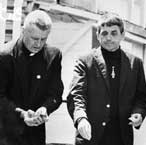 Daniel and Philip Berrigan |
1921- 1923-2002 |
The Berrigan brothers - both priests - led the antiwar and antidraft movements during the Vietnam War. In May 1968, the two brothers, along with seven other Catholic protesters, burned the records of the Catonsville, Maryland, draft board with homemade napalm. Their arrest and trial propelled the Berrigans to national prominence. They helped found the Catholic resistance movement: estimates for draft board raids range from 53 to 250. After Vietnam, the brothers refocused on nuclear disarmament. |
"There is no peace because the making of peace is at least as costly as the making of war - at least as exigent, at least as disruptive, at least as liable to bring disgrace and prison and death in its wake. - Daniel Berrigan "Herein lies a riddle: How can a people so gifted by God become so seduced by naked power, so greedy for money, so addicted to violence, so slavish before mediocre and treacherous leadership, so paranoid, deluded, lunatic?" - Philip Berrigan "Nuclear weapons are the scourge of the earth; to mine for them, manufacture them, deploy them, use them, is a curse against God, the human family, and the earth itself." - Philip Berrigan |
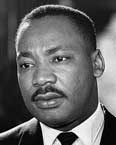 Martin Luther King, Jr. |
1929-1968 | Baptist minister and civil rights activist. He led the 1955 Montgomery Bus Boycott and helped found the Southern Christian Leadership Conference in 1957, serving as its first president. King's efforts led to the 1963 March on Washington, where King delivered his "I Have a Dream" speech. In 1964, King became the youngest person to receive the Nobel Peace Prize for his work to end racial segregation and racial discrimination through civil disobedience and other non-violent means. | I was increasingly compelled to see the war as an enemy of the poor and to attack it as such. Perhaps the more tragic recognition of reality took place when it became clear to me that the war was doing far more than devastating the hopes of the poor at home. It was sending their sons and their brothers and their husbands to fight and to die in extraordinarily high proportions relative to the rest of the population. We were taking the black young men who had been crippled by our society and sending them eight thousand miles away to guarantee liberties in Southeast Asia which they had not found in southwest Georgia and East Harlem. - Beyond Vietnam: A Time to Break Silence |
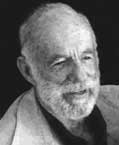 Dr. Benjamin Spock |
1903-1998 | Pediatrician who wrote the bestselling book "Baby and Child Care." In 1962, Spock joined The Committee for a Sane Nuclear Policy (SANE). He was politically outspoken and active in the movement to end the Vietnam War. In 1968, he and four others were prosecuted by the government on charges of conspiracy to counsel, aid, and abet resistance to the draft. In the 1970s and 1980s, Spock demonstrated and lectured against nuclear weapons. | The destruction of rice, crops and livestock; the burning and bulldozing of entire villages consisting exclusively of civilian structures; the interning of civilian non-combatants in concentration camps; the summary executions of civilians in captured villages who could not produce satisfactory evidence of their loyalties or did not wish to be removed to concentration camps; the slaughter of peasants who dared to stand up in their fields and shake their fists at American helicopters; these are all actions of the kind which the United States and the other victorious powers of World War II declared to be crimes against humanity for which individuals were to be held personally responsible even when acting under the orders of their governments... - A Call to Resist Illegitimate Authority |
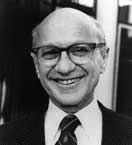 Milton Friedman |
1912-2006 | Nobel prize winning economist who was instrumental in ending the draft in the US. His anti-draft activity led to participation in Nixon's President's Commission on an All-Volunteer Force. Friedman's books include "Capitalism and Freedom" and "Free to Choose." He stressed the close connection between political freedom and economic freedom. He called the draft "inconsistent with a free society". | General William Westmoreland testifies that he did not want to command an army of mercenaries. Friedman replied, "General, would you rather command an army of slaves?" The general drew himself up and said, "I don't like to hear our patriotic draftees referred to as slaves." Friedman replied, "I don't like to hear our patriotic volunteers referred to as mercenaries. ... If they are mercenaries, then I, sir, am a mercenary professor, and you, sir, are a mercenary general; we are served by mercenary physicians, we use a mercenary lawyer, and we get our meat from a mercenary butcher." |
 Pete Seeger |
1919- | American folk singer as well as peace and environmental activist. Blacklisted from TV in the fifties and early sixties for being a commie, he was a key figure in the folk revival of the 1960s. He wrote or co-wrote such songs as "Where Have All the Flowers Gone?", "If I Had a Hammer", and popularized classic protest songs like "We Shall Overcome." Seeger was instrumental in cleaning up the Hudson River. |
"Songs won't save the planet, but neither will books or speeches. Songs are sneaky things; they can slip across borders." "Throughout history, the leaders of countries have been very particular of what songs should be sung. We know the power of songs." "We were - waist deep in the Big Muddy, but the big fool said to push on." - from a protest song about the Vietnam War |
 Joan Baez |
1941- | Folk singer, civil rights, peace, and human rights activist. In 1964, Baez publicly endorsed resisting taxes by withholding sixty percent of her 1963 income taxes. She co-founded the Institute for the Study of Nonviolence (in 1965) and encouraged draft resistance at her concerts. She was and is a frequent participant in anti-war marches and rallies from the 1969 Moratorium to End the War in Vietnam to today's protests against the war in Iraq and Afghanistan. |
"That's all nonviolence is - organized love." "If it's natural to kill, how come men have to go into training to learn how?" "The only thing that's been a worse flop than the organization of non-violence has been the organization of violence." "You don't get to choose how you are going to die or when. You can only decide how you're going to live." |
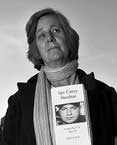 Cindy Sheehan |
1957- | American anti-war activist whose son, Casey, was killed during his service in the Iraq War on April 4, 2004. She attracted national and international media attention in August 2005 for her extended anti-war protest at a makeshift camp outside President George W. Bush's Texas ranch. In 2006 Sheehan wore a T-shirt reading "2,245 Dead. How many more?" to Bush's State of the Union address and was removed and arrested. In 2007 she traveled to Cuba and called for the closure of the U.S. military prison at Guantanamo Bay. |
"I was told my son was killed in the war on terror. He was killed by George Bush's war of terror on the world." "President Bush says we're safer fighting them there than over here. Why are we safer because 120,000 civilians are dead? What makes their babies less precious than ours?" "We were told that we were attacked on 9/11 because the terrorists hate our freedoms and democracy ... not for the real reason, because the Arab Muslims who attacked us hate our Middle-Eastern foreign policy. |